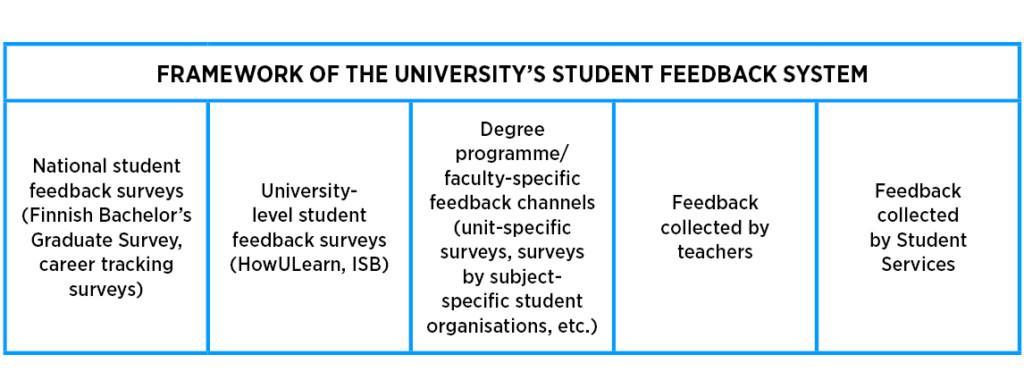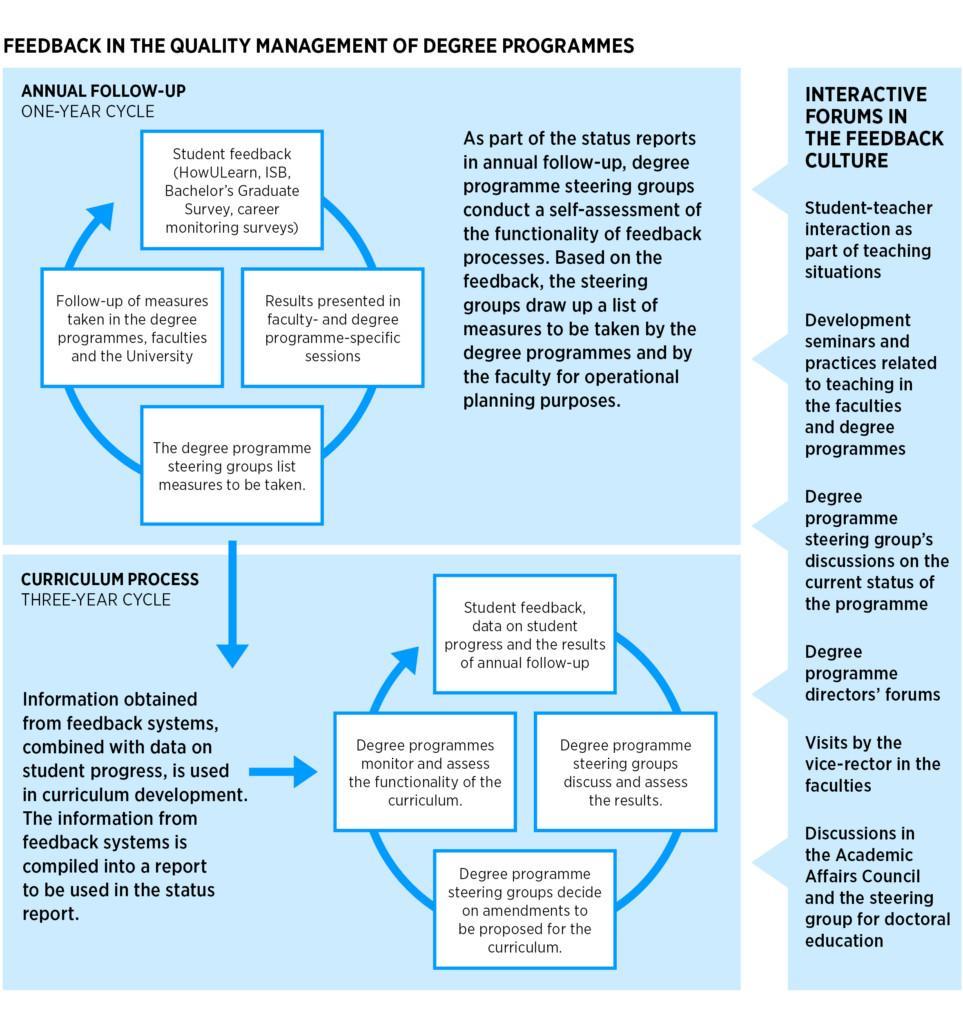The university collects student feedback data systematically to enhance the quality of education
For its degree programmes at bachelor’s, master’s and doctoral degree levels, there are digital tools available for monitoring students’ progress and responsibilities have been assigned to directors of programmes and steering groups. The University of Helsinki collects data from the national, university, degree programme, teacher and student services level. The degree programme, faculty-specific or course surveys are not compulsory, but the teachers are encouraged to collect feedback. The HowULearn questionnaire provides feedback on the teaching and development of students’ learning skills and workloads. The data are analysed at degree programme and faculty levels and cover the demographics of the students, their progress, and their experiences of studying at university.
The usefulness and importance of the different systems for collecting feedback is acknowledged by staff and contributes to a quality culture built on evidence from data. Although several channels for student feedback are used and have an established role in the quality management of teaching and learning, some aspects can still be improved. Responsibilities for collecting course feedback – whether it is the responsibility of the teachers, the degree programme or the faculty or even the student associations – are sometimes unclear. Possibly the new systems, HowUStudy and Norppa, will clarify this. Many of the student associations, which are numerous at the university, also have their own feedback surveys, and provide that feedback in programme steering groups. The university’s student feedback systems such as HowULearn create valuable data on student learning, but as mentioned by some students they also want to give feedback concerning their programmes and structures.
As described in SAR, as part of the annual follow-up cycle, national- and university-level feedback results are presented in faculty- and degree programme-specific sessions. Degree programme steering groups conduct a self-assessment in which the feedback is analysed, and programme-level and faculty-level measures identified. The new Norppa course feedback system was recently launched, but information on the feedback process from a PDCA cycle perspective is not yet available. The audit team suggests that the course-level feedback is also integrated into the steering group self-assessment process. Feedback systems for doctoral students focusing on programme- or doctoral school-level feedback also need attention.
The audit team recommends a continuous dialogue with students regarding their possibilities to influence the degree programme they are engaging in. In addition, the university should initiate closer collaboration and discussion with the student associations regarding their role in relation the university’s role in collecting student feedback. If feedback is collected too many times, it may result in low response rates in surveys. On the other hand, not all students understand why they should fill out the questionnaires as they are not clear about what it might lead to or how it will benefit them. This also leads to low response rates and reduced trust in the outcomes of questionnaires being valid.
Several students, including international and doctoral students, met by the audit team were uncertain whether their feedback had an impact, and if their views were considered when they were heard. When improvements and developments are made, it is thus important to make them visible, so that students can see that their feedback matters. Although student feedback may have a big impact, that information is not necessarily reaching students. A good thing would be to involve student associations in the analysis of the feedback and in discussions about what could be improved and how. There are also some good practices of mid-course evaluations, a practice that the audit team recommends could be employed on a wider range of courses.
The university monitors and evaluates educational degree programmes in a systematic way
The university gives strong evidence of long-standing, university-level development of degree programmes and teaching, which has transformation in university pedagogy at the core. A driving force has been the Centre for University Teaching and Learning (HYPE) and its staff. The audit team considers the implementation and spreading of HowULearn as a tool for evaluation and enhancement of education as a great example of the impactful work at the university, and even nationally.
The university employs annual follow-ups and reviews as a tool in the quality management of degree programmes that are connected to university- and faculty-level operations planning. The steering groups discuss the status of programmes and conduct the annual programme reports. This system, based on the sample of reports reviewed and audit discussions, seems to work well and is a good practice for systematically integrating the analysis into the annual operations management process.
As mentioned, the university has undertaken a massive reform of bachelor’s, master’s and doctoral degree programmes. The reform was initiated based on feedback received and different evaluations. A review of the degree programmes and the reform will be conducted next year, and in the future at three-year intervals. This is well in line with the European guidelines (ESG) requiring periodic review of degree programmes.
The link with the changing needs of society and working life is in general taken into consideration in the programmes. The ways and the extent to which programmes take the perspective of external stakeholders into account and are geared towards relevance to working life differ due to the various types of programmes offered at the university. There is still room for the university to carry out more versatile monitoring of how its education provision impacts and links to society through following up on employment rates more systematically, for instance. Continuing education needs are considered effectively in the university’s educational provision and are also well linked to the university-level strategic development processes.
Systematic developments of support services are based on the needs of students and staff
The support services as part of University Services are part of the annual operations planning process with linked assessment. In addition, University Services have their own surveys and there is evidence of data use for the improvement of support services for both staff and students.
There is a high level of understanding for students with special needs, a group of students that seems to be expanding. A specific task group has worked on special needs and developed the concept of ‘individual needs’ to be more flexible and support students across campuses.
The Centre for University Teaching and Learning (HYPE) plays an important role in researching higher education and implementing pedagogical solutions, and in linking teaching practice to higher education research. The responsibilities of HYPE as well as university services have clear responsibilities and are contributing to a systematic approach to the development of teaching and learning throughout the university (see also Section 3.2). There are ample opportunities for collaboration and sharing informally through various networks such as the forums for programme directors. The educational leadership course developed by HYPE together with the HR department also afford good opportunities for the development of leadership and educational leadership among meso level leaders.

